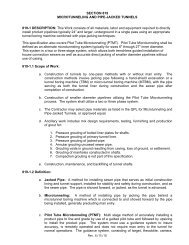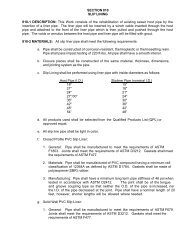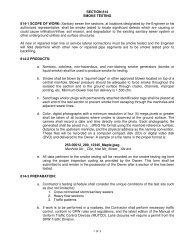Contents
Construction Management Plan - Baton Rouge Department of Public ...
Construction Management Plan - Baton Rouge Department of Public ...
- No tags were found...
You also want an ePaper? Increase the reach of your titles
YUMPU automatically turns print PDFs into web optimized ePapers that Google loves.
2.4.8.3 Post Exposure<br />
CH2M HILL will provide exposed employees with a confidential medical examination. This<br />
examination includes the following procedures:<br />
• Documenting the exposure;<br />
• Testing the exposed employee's and the source individual's blood (with consent);<br />
• Administering post-exposure prophylaxis;<br />
• Evaluating any reported illness.<br />
If the exposed employee consents to blood collection but does not give consent for testing,<br />
the sample will be preserved for 90 days. The employee can give consent any time during<br />
the 90 days.<br />
If the source individual does not consent to testing, CH2M HILL will establish that consent<br />
cannot be obtained. If consent to collect the blood is obtained but consent to test is not, the<br />
blood sample will be preserved for 90 days. If within 90 days the source individual agrees to<br />
testing, the blood will be tested. Results of the source individual's testing are made available<br />
to the exposed employee's physician.<br />
Within 15 days of the completed examination, CH2M HILL will verify that the employee<br />
has been informed of the results.<br />
2.4.9 Untreated Wastewater and Wastewater Treatment Plants<br />
(Reference CH2M HILL SOPs HSE&Q-202, Bloodborne Pathogens, HSE&Q 113, Medical Monitoring)<br />
Domestic sewage is the used water from a home or community and includes toilet, bath, laundry,<br />
and kitchen-sink waste. Sewage from the community may include industrial waste, groundwater,<br />
and surface water. Normal sewage from a private sewage disposal system is normally 99.8 percent<br />
water and 0.2 percent total mineral and organic solids. Large numbers of disease-producing<br />
organisms that can cause diarrhea, bacillary dysentery, infectious hepatitis, and salmonella may be<br />
found in excreta. Personnel shall avoid contact to exposed portions of the body and use good<br />
personal hygiene practices.<br />
As a prophylactic protection, all employees with the potential for exposure to untreated<br />
wastewater will have, at a minimum, hepatitis A, hepatitis B series (can be in progress) and<br />
current tetanus vaccinations. If an employee is given the opportunity to be vaccinated and desires<br />
to decline the vaccination, the Vaccination Declination Form must be signed by the employee and<br />
maintained in the employee file.<br />
When working in wastewater treatment plants, employees should exercise the following<br />
precautions:<br />
• Do not eat or drink in plant areas;<br />
• Minimize contact with surfaces;<br />
• Don’t touch eyes, ears, nose and mouth;<br />
• Wash hands immediately upon leaving the site or going into office areas. Ensure that adequate<br />
washing facilities are available for employees. For situations where hand washing facilities are<br />
not readily available, antibacterial hand gels can be used to prevent the spread of germs;<br />
• If touching contaminated surfaces is unavoidable, wear surgical-type nitrile gloves. Carefully<br />
remove gloves by rolling them inside out, and wash hands immediately;<br />
• Avoid shaking hands with other employees, and maintain a distance of approximately 3 feet<br />
during conversations to avoid spread of colds, flu and other contagious diseases;<br />
A-40 GNV310133632156.DOC/090840008












